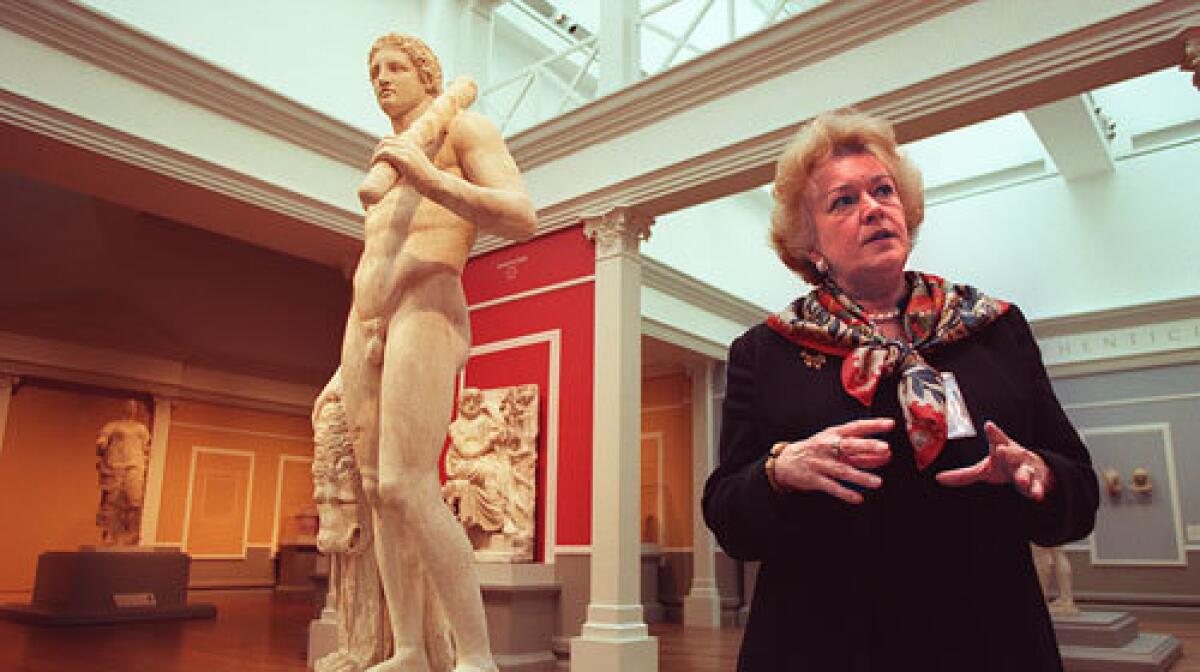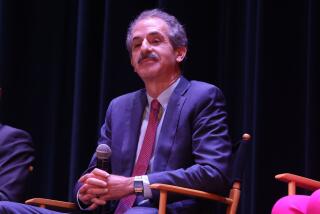State Ends Inquiry, Names Monitor for Getty Trust

After a yearlong investigation, the California attorney general’s office has concluded that the J. Paul Getty Trust’s former chief executive, Barry Munitz, and board of trustees misused organization funds on lavish travel, gifts and perks.
In a report issued Monday, state officials said they would not seek further penalties against the trust because they found no fraud and the misspent money was recouped when Munitz agreed to repay the Getty $250,000 and forgo more than $2 million in benefits when he was ousted in February.
Nevertheless, the attorney general took the unprecedented step of appointing an independent monitor — former state Atty. Gen. John K. Van de Kamp — to make sure the $10-billion private foundation follows through on a long list of promised reforms.
“It’s not like they’re getting off scot-free,” spokesman Tom Dresslar said. “The settlement [with Munitz] made the trust whole and then some. The message should be that you’re going to be held accountable if the organization isn’t made whole.”
Getty officials expressed relief that the investigation was over and said they would cooperate with Van de Kamp.
“There were some mistakes made . We could have acted earlier and maybe dug a little farther,” said Louise Bryson, a trustee since 1998 and the current board chairwoman. As the attorney general’s report acknowledged, she added, the trust has moved forward on its own to ensure “this will never happen again.”
The state launched an investigation into the Getty’s financial practices in July 2005 after Times stories described how Munitz had used Getty resources to bankroll a luxurious lifestyle. Subsequent stories revealed that board members had rubber-stamped Munitz’s expenses without reviewing them and had benefited personally from trust transactions.
On Monday, Munitz returned a call for comment on the state’s findings, referring a reporter to an associate who could not be reached.
The attorney general’s office concluded that the trust improperly covered travel expenses incurred by Munitz’s wife, deeming his justifications for her presence on business trips “unpersuasive.”
Trustees also erred in allowing Munitz to use Getty staff to run personal errands “on many occasions” and to spend more than $20,000 on gifts of artwork presented to four retiring board members, state investigators said.
The Times reported Munitz regularly sent his driver to Long Beach to pick up taped episodes of his favorite TV shows, and on one occasion asked a secretary to track down blood orange juice for his wife, who had enjoyed it on a trip to Europe.
Although state officials determined that the trust “violated no clear rule” in paying for Munitz to fly first class, stay in luxury hotels and eat at expensive restaurants, they called the board’s willingness to foot the bills “inappropriate” and, in some cases, “unreasonable.”
State officials also took issue with consulting fees paid to Iris Mickein, a graduate student and former Getty intern whom Munitz employed as a senior advisor.
Investigators concluded that Mickein had done insufficient work to earn the funds.
Sen. Charles E. Grassley (R-Iowa), chairman of the Senate Finance Committee and a vocal critic of excess in the nonprofit sector, said the attorney general’s findings showed “what can happen when boards of directors aren’t asking enough questions.”
Grassley noted, however, that the attorney general’s office stopped short of criticizing Munitz’s compensation, which ranked among the nation’s highest for nonprofit chief executives, or a $300,000 book deal Munitz promised to retired board Chairman David Gardner.
“It’s important to note that even with the attorney general’s good work, he had to take a pass in some troubling areas, like executive compensation and business relations with trustees, because current law is limited or unclear,” he said. “This tells me we need to look at changing the state and federal laws in these areas.”
State officials concluded that several other heavily scrutinized Getty transactions were in accord with California law as well, among them severance payments to former museum Director Deborah Gribbon and Munitz’s chief of staff, Jill Murphy.
“While the payment may be considered generous, it appears to be reasonably based on the damages she could have received if she had filed a lawsuit,” the report said of the $3 million paid to Gribbon. “Indeed, those damages might well have greatly exceeded the amount of the approved separation payment.”
Grants made to a filmmaker whom Munitz had befriended, to the Clinton White House and to the Getty’s former chief operations officer to, among other things, help pay for office furnishings in his new job, were found to fall within the trust’s broader charitable purpose. State officials also said the sale of Getty property to philanthropist Eli Broad, Munitz’s close friend, was handled properly and for a fair price.
The attorney general’s charitable trust division, which carried out the investigation, has the authority to impose civil penalties, remove trustees or recommend the revocation of a nonprofit’s tax-exempt status if it discovers gross mismanagement or fraud.
Dresslar denied that the agency had gone easy on the trust, or on Munitz, whom Lockyer has described as a close friend.
“They’ve paid some consequences,” he said. “The trust got its money back. We think it’s an appropriate result.”
In two years of near-constant scrutiny, the Getty’s once-gilded image has taken a pounding.
In addition to Munitz, much of the Getty’s senior management has left, as have several board members, including former Chairman John Biggs, who retired in early August.
The trust’s troubles reverberated nationally, becoming part of a national debate about oversight at nonprofits and the sector’s need for reform.
“I think it embarrassed lots of people in the nonprofit world,” said Diana Aviv, the president and chief executive of Independent Sector, a Washington-based coalition that lobbies on behalf of nonprofit groups.
As a monitor, Van de Kamp will review progress reports submitted by the Getty every six months through the end of 2007 and advise the attorney general’s office of the nonprofit’s progress.
“It’s important to recognize that this report is all about the past,” said attorney Ronald Olson, whose firm was hired by the Getty board almost a year ago to conduct an internal review and represent the nonprofit’s interest during the attorney general’s investigation.
“With the past corrected,” he said, “the trustees have a grand opportunity to rebuild the reputation of the Getty in a way that hopefully will match its vast resources and treasures.”
*
jason.felch@latimes.com
ralph.frammolino@latimes.com
robin.fields@latimes.com
More to Read
Start your day right
Sign up for Essential California for news, features and recommendations from the L.A. Times and beyond in your inbox six days a week.
You may occasionally receive promotional content from the Los Angeles Times.






